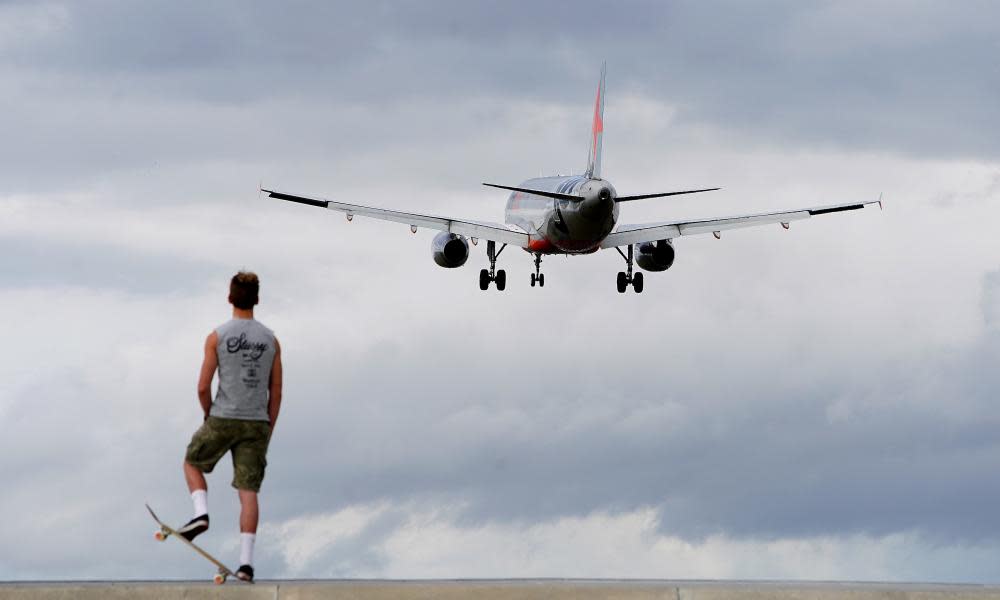Australians stranded overseas willing to wear ankle bracelets while quarantining to return home

An Australian who is stranded overseas says most people in his situation would be prepared to wear an ankle bracelet while quarantining at home if that was what it took for authorities to lift international flight caps.
A Senate committee on Covid-19 will hear directly from Australians stuck overseas on Thursday. They want politicians to consider options other than hotel quarantine to repatriate more than 27,000 citizens unable to return home.
Pieter den Heten, a 44-year-old Dutch Australian user experience designer, has been stuck in Amsterdam for more than six months after his return flight was cancelled. He’s separated from his partner, Fran, who is living in their Syndey home.
Related: Why are more than 25,000 Australians still stranded overseas, six months into the pandemic?
Spurred on by stories of other stranded Australians, den Heten started removethecap.com, a website that shows the locations of Australians stuck around the world. So far, more than 2,600 people across 40 countries have registered.
Den Heten plans to tell the committee on Thursday that more needs to be done beyond national cabinet’s decision last week to increase the weekly national arrival cap from 4,000 to 6,000.
After reading the stories submitted to his site, he believes most stranded Australians would tolerate alternative quarantine methods. He said it was tough to hear governments argue quarantine was at capacity when many hotels were almost empty and the system coped with higher numbers earlier in the pandemic.
“When they announced these caps they didn’t anticipate or clearly think through what they would lead to,” den Heten told Guardian Australia ahead of Thursday’s hearing.
“From a government, that shows incompetence and a lack of insight. When you test positive in Australia, the government lets you quarantine at home, and authorities check up on you that you haven’t left. But when you’re a citizen and you arrive home, even from a safe country and if you test negative, you have to quarantine in a hotel.”
Related: 'Shattered, heartbroken, financially ruined': stranded Australians plead for help
Den Heten thinks most stranded Australians would be prepared to wear an ankle bracelet in their home if it gave authorities the confidence to allow returned travellers to quarantine without going to a hotel.
“We have asked for a very clear explanation as to why there are no alternatives to [hotel] quarantine – it’s not rocket science,” he said.
The Senate committee on Thursday will also hear evidence from the Australian Border Force commissioner, Michael Outram, the Department of Home Affairs secretary, Michael Pezzullo, and foreign affairs and transport department officials.
Since arrival caps were introduced in July to ease pressure on hotel quarantine, flights have been landing in Australia with fewer than 30 passengers, and as few as four economy passengers. Frustrated airlines have acknowledged they are cancelling economy, and increasingly business class tickets, so they can prioritise more expensive passengers to remain profitable.
Deanne Vowels, who has been stuck with her husband and five children in London since their April flight back to Sydney was cancelled, is also set to speak before the committee on Thursday.
In August, Guardian Australia revealed how the family had been forced to live in a trailer in a relative’s backyard, after exhausting their savings while waiting for a flight home, with several subsequent flights they were booked on also being cancelled.
Stranded Australians have reportedly being told by embassy officials to start crowdfunding campaigns to pay for their living costs or upgraded flights home.
Related: Raised flight caps welcome but much more needed to help stranded Australians, airlines warn
Nicola Britton, a GoFundMe Australia senior regional manager, told the Guardian more than 130 campaigns have been set up to help Australians return home, generating in excess of $300,000.
“It tends to be the place that people turn to in their time in need and when traditional support sources have fallen out, and when campaigns start up it’s a warning sign of certain societal issues,” she said.
In the past six weeks, there has been a “new wave” of campaigns start “particularly around helping people afford business class flights home”.
“The trends are very tied to government announcements on borders. While I’m really glad our platform exists to offer the support, we would prefer these people not be in these situations,” Britton said.
Earlier this month, the Australian high commission in London began deploying teams of Australian diplomats to Heathrow airport to help stranded Australians who have been forced to camp at the airport. Citizenship law experts have also raised concerns the arrival caps are unconstitutional.
The caps last until 24 October.


